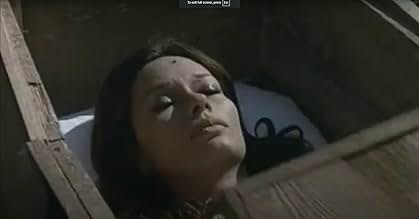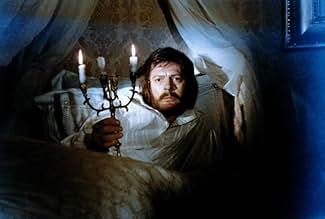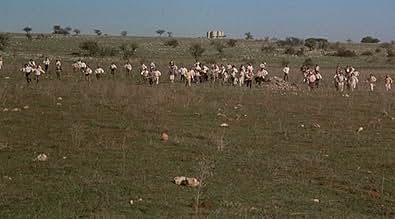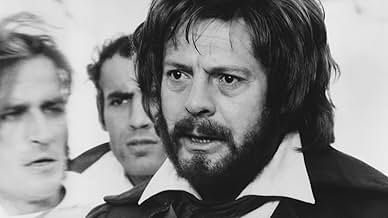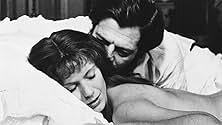Allonsanfàn
- 1974
- 1h 40m
IMDb RATING
7.0/10
1.4K
YOUR RATING
A anarchist leader (Fulvio) wishes to retire, as he is old and tired. He tries to hide himself, but his friends find him and insist he carries on helping them.A anarchist leader (Fulvio) wishes to retire, as he is old and tired. He tries to hide himself, but his friends find him and insist he carries on helping them.A anarchist leader (Fulvio) wishes to retire, as he is old and tired. He tries to hide himself, but his friends find him and insist he carries on helping them.
- Directors
- Writers
- Stars
- Awards
- 3 nominations total
- Directors
- Writers
- All cast & crew
- Production, box office & more at IMDbPro
Featured reviews
It is my first encounter with Taviani brothers' work, my instant gut-feeling is that this surrealistic political-drama about a traitor's ill-fated fallout is perhaps blemished by the incompatibility of our generation, I reluctantly pigeonhole it to those films inevitably go astray from their glorious road along the unstoppable torrent of time!
Marcello Mastroianni this time around employs a substantially anti-hero persona opponent to his more audience-friendly role as the marquee Italian dream-lover. An abnormally bitter repugnance exudes from his character brims with all the screen time and I can sense a tint of misogyny levitating in the air with an inexplicably compelling thespian vibe. The lesser characters are all one-dimensional notwithstanding, a feral Lea Massari (from THE ADVENTURE) still could draw some attention for her very underdeveloped role.
All the sectors are somehow quirky enough to create certain discontinuity in the narrative, which could be a deliberate novelty at that time, but fails to leave sympathetic impression throughout, plus without the adequate stewing time, I might wonder it might be too hasty for audience to ruminate or even reflect the actual happening in the film, especially for a foreigner.
Marcello Mastroianni this time around employs a substantially anti-hero persona opponent to his more audience-friendly role as the marquee Italian dream-lover. An abnormally bitter repugnance exudes from his character brims with all the screen time and I can sense a tint of misogyny levitating in the air with an inexplicably compelling thespian vibe. The lesser characters are all one-dimensional notwithstanding, a feral Lea Massari (from THE ADVENTURE) still could draw some attention for her very underdeveloped role.
All the sectors are somehow quirky enough to create certain discontinuity in the narrative, which could be a deliberate novelty at that time, but fails to leave sympathetic impression throughout, plus without the adequate stewing time, I might wonder it might be too hasty for audience to ruminate or even reflect the actual happening in the film, especially for a foreigner.
As an Italian period film taking place in the early 1800s, we get everything we would suppose out of the viewing experience in these two hours. The filming locations are utterly gorgeous, and the production design and art direction are flush with equally beautiful detail. The hair, makeup, and especially the costume design are just as fetching and attentively realized, and even the lighting and cinematography are sights for sore eyes. The stunts and practical effects on hand look terrific, and to much the same point, the cast give firm, commendable performances to bring the drama to bear. It's a compelling if dark and somewhat grim story that brothers Paolo and Vittorio Taviani give us: the story of a bitter, disillusioned revolutionary, and those he cruelly betrays while selfishly seeking a more comfortable life. All along the way one can plainly see and feel how lovingly this was crafted, with some particular odds and ends standing out (including a brief sequence near the end), and the original score of master composer Ennio Morricone is simply a gift. By and large, 'Allonsanfàn' is excellent, and it's well worth watching no matter what one is looking for.
That doesn't mean it's perfect. While Morricone's dominant theme is a treasure - there's a reason Quentin Tarantino would notably borrow it thirty-four years later - I'm struck by how little variety there is in the music, and I can't help but wonder if said theme would be more effective if it were exercised more sparingly. In other regards I'm not so certain what it is that bugs me about the picture, but it arises somewhere between the Taviani's writing and direction. It's a marginal lack of total clarity, perhaps, in how characters are introduced or beats laid out, or maybe a slight lack of finesse: amorphousness and curious hard edges, both at once and made more pronounced by some small tidbits that feel unnecessary or indulgent. None of this is nearly so severe as to specifically detract from the feature, but truthfully I just don't find the whole to be as rich and vibrant as I supposed based on scant foreknowledge. (For the record, said foreknowledge includes two seconds-long clips removed from context, Morricone's theme, and the premise.) 'Allonsanfàn' is solid, engaging, enjoyable, and satisfying, but it's not altogether grabbing or rewarding.
Maybe I'm nitpicking, though. Far more than not we get what we want, and this is well written and well made, a testament to the skills of those involved with regards to both film-making and storytelling, not to mention acting. Scrutinize as we may, all told there's not much going wrong with this title, and to the extent that it falls short it's a matter of semantics, or personal preference, more than substance. I'd stop short of saying 'Allonsanfàn' is a must-see, but whatever your impetus for watching it's well worth checking out, and at length, maybe that's all it needs to be.
That doesn't mean it's perfect. While Morricone's dominant theme is a treasure - there's a reason Quentin Tarantino would notably borrow it thirty-four years later - I'm struck by how little variety there is in the music, and I can't help but wonder if said theme would be more effective if it were exercised more sparingly. In other regards I'm not so certain what it is that bugs me about the picture, but it arises somewhere between the Taviani's writing and direction. It's a marginal lack of total clarity, perhaps, in how characters are introduced or beats laid out, or maybe a slight lack of finesse: amorphousness and curious hard edges, both at once and made more pronounced by some small tidbits that feel unnecessary or indulgent. None of this is nearly so severe as to specifically detract from the feature, but truthfully I just don't find the whole to be as rich and vibrant as I supposed based on scant foreknowledge. (For the record, said foreknowledge includes two seconds-long clips removed from context, Morricone's theme, and the premise.) 'Allonsanfàn' is solid, engaging, enjoyable, and satisfying, but it's not altogether grabbing or rewarding.
Maybe I'm nitpicking, though. Far more than not we get what we want, and this is well written and well made, a testament to the skills of those involved with regards to both film-making and storytelling, not to mention acting. Scrutinize as we may, all told there's not much going wrong with this title, and to the extent that it falls short it's a matter of semantics, or personal preference, more than substance. I'd stop short of saying 'Allonsanfàn' is a must-see, but whatever your impetus for watching it's well worth checking out, and at length, maybe that's all it needs to be.
In early 19th century Italy a middle aged radical called Fulvio Imbriani (Marcello Mastroianni) finds his loyalty and commitment to his political comrades being tested after he is released by the Italian regime. Released in1974 writer/directors Paolo and Vittorio Taviani's feature film is a historical melodrama set during 'The Restoration', and filmed in a mix of opulent settings, and at times bare landscapes and lakes. Dealing with a similar theme to the Taviani's previous film 'St. Michael Had a Rooster', like that film it has a certain amount of comparatively complex psychologising and irony about the mental trauma of a revolutionary whose faith in the cause is slipping. It's a story of the ties of family and the past, the corruption of class, self-interest, and the power of money and position, versus political commitment and conviction, and general communal interest. A lot of the film's effect is achieved through a kind of 'visual psychology' encompassing colour, landscape, set, composition, movement, and other visual devices ( this is a good visual film with cinematography by Giuseppe Ruzzolini), combined with music, to create a film parts of which almost seem like a kind of train of thought. In the words of 'La Marseillaise' - 'Allons Enfants/Arise Children', from the lies and fantasy of your world.
Marcello Mastroianni's story is never simple. He is released from prison in hopes that he would lead authorities to the underground resistance, but instead he finds himself torn between wealthy and a family he once had, and the opportunity to help his brethren save others from the dreaded cholera. It is a tough choice, and in the end Mastroianni (as in previous films) has done a great job of building tension within his character. The moral dilemma he is faced with is a tough one, kill those he was once involved with in essence betray them, or forever be chased by his past sins. He chooses the latter, and uses trickery and trust to break this small group of bandits. "Allonsanfan" can be spliced into three different distinct films, each with amazing imagery, but lacking the development needed to really bring the audience further into the film. The first is with Mastroianni heading home, overcoming sickness, finding his girlfriend, and all the while plotting an ambush. Great scenes, could have been a great moment, but we know nothing about his family or girlfriend outside of what they mutter or what the subtitles give us. We needed to see more of his interaction with these random characters. The second part involves his son, good, but was again cut short and strange because we knew nothing about it outside of the fact that he had a son. I can't even go further into the entire frog scene, I am still trying to wrap my brain around that. The incident on the lake was another example of having a strong cinematographer, but a apathetic storyteller. Finally, there was the scene in the South where we see why this film is entitled "Allonsanfan", but by this point the excitement has died, and we are just waiting for a finale.
This film did involve hard work and dedication by the entire crew to make, with that said; I cannot just fully say that this film was a failure. There were those that worked hard on this project like the cinematographer and the amazing score by Ennio Morricone. These elements alone brought this film out of one that would make any viewer fall asleep into one worth viewing at least once. The story is where most of the trouble laid, and again, I cannot state that it was one of those cases where there were too many ideas and not enough time or conjoining scenes. We would begin a thought, but end elsewhere in the story (again, see the segment with the frog). Perhaps some of it was done to try to bring sympathy to Mastroianni, but it could have been done without the random acts of history or perhaps more history. There was a moment in this film where I thought we could have used more history devoted to the story. That is what was missing from scene to scene. At times our characters were moving without a motive, and history could have interjected to help the audience better see the motives and reasoning. Perhaps it was my lack of knowledge of what Italy was like at the end of Napoleon's era, but more explanation could have been used do develop our bandits, or the motives behind Mastroianni's deeds.
On a small note, if you decide to watch this film on VHS, beware of the subtitles. I am very good at reading subtitles on a foreign film, I hate the sound of dubbed voices, but with "Allonsanfan", the subtitles were all over the place. There were several occasions where they were missing from conversations, where one character would have a three-minute speech and the only word to come up in the subtitle would be "yes", or when half the words were missing from the side of the television. It was troublesome to read and watch at the same time, so to get the full effect of the film, I found myself turning off the sound and reading to the best of my ability. Probably lessoned the film, but kept me in check with the meager characters.
Overall, I cannot say this was a horrible film, but it won't be viewed again by yours truly. I may challenge myself to see it again on DVD if it ever is released, but for now, it needs to tighten up its story and used a bold marker on its characters. Mastroianni was superb in his role, but nobody could keep up with him. They were all overacting, overbearing, boring, or just plain unknown. There were other characters in this film, but if you asked me to name one well, maybe Charlotte, but that is it I don't think I could. The Taviani's had some great ideas, but the execution is where they lacked. There could have been more A to B to C structure with the story, instead it was as if they built three separate stories and hastily glued them together. If you were forced to watch this film, I think you could pull away by just seeing the end and knowing everything you missed. It is a sharp ending, one wishes only that the rest of the film were that way. One viewing, if you dare if not you are not missing anything. There are better Italian films out there.
Whew, this one took me back to when I watched Topol's "Gallileo". Too stagy for my enjoyment.
Grade: ** out of *****
This film did involve hard work and dedication by the entire crew to make, with that said; I cannot just fully say that this film was a failure. There were those that worked hard on this project like the cinematographer and the amazing score by Ennio Morricone. These elements alone brought this film out of one that would make any viewer fall asleep into one worth viewing at least once. The story is where most of the trouble laid, and again, I cannot state that it was one of those cases where there were too many ideas and not enough time or conjoining scenes. We would begin a thought, but end elsewhere in the story (again, see the segment with the frog). Perhaps some of it was done to try to bring sympathy to Mastroianni, but it could have been done without the random acts of history or perhaps more history. There was a moment in this film where I thought we could have used more history devoted to the story. That is what was missing from scene to scene. At times our characters were moving without a motive, and history could have interjected to help the audience better see the motives and reasoning. Perhaps it was my lack of knowledge of what Italy was like at the end of Napoleon's era, but more explanation could have been used do develop our bandits, or the motives behind Mastroianni's deeds.
On a small note, if you decide to watch this film on VHS, beware of the subtitles. I am very good at reading subtitles on a foreign film, I hate the sound of dubbed voices, but with "Allonsanfan", the subtitles were all over the place. There were several occasions where they were missing from conversations, where one character would have a three-minute speech and the only word to come up in the subtitle would be "yes", or when half the words were missing from the side of the television. It was troublesome to read and watch at the same time, so to get the full effect of the film, I found myself turning off the sound and reading to the best of my ability. Probably lessoned the film, but kept me in check with the meager characters.
Overall, I cannot say this was a horrible film, but it won't be viewed again by yours truly. I may challenge myself to see it again on DVD if it ever is released, but for now, it needs to tighten up its story and used a bold marker on its characters. Mastroianni was superb in his role, but nobody could keep up with him. They were all overacting, overbearing, boring, or just plain unknown. There were other characters in this film, but if you asked me to name one well, maybe Charlotte, but that is it I don't think I could. The Taviani's had some great ideas, but the execution is where they lacked. There could have been more A to B to C structure with the story, instead it was as if they built three separate stories and hastily glued them together. If you were forced to watch this film, I think you could pull away by just seeing the end and knowing everything you missed. It is a sharp ending, one wishes only that the rest of the film were that way. One viewing, if you dare if not you are not missing anything. There are better Italian films out there.
Whew, this one took me back to when I watched Topol's "Gallileo". Too stagy for my enjoyment.
Grade: ** out of *****
Allonsanfan is one of those rare foreign language films about which dedicated viewers know a lot without having gotten a chance to see it. It is rather unfortunate that this classic film directed by Taviani brothers has neither been shown repeatedly on TV screens around the world nor its DVD is as easily available as that of "Braveheart".If we look closely at the productivity of Italian cinema,we will come to know that there is only an Italian film ("La nuit de Varennes" directed by Ettore Scola) which similar to it in terms of style and content.Allonsanfan is quite similar to a Hungarian auteur Miklos Jancso's film but with no nudity,no brutality and no humiliation.At the core of this film is a detailed description of the tough life of a determined revolutionary.Sometimes he is trusted by his followers, sometimes he is not.Family ties are of great importance for him as any other aristocrat.The only unusual aspect of his behavior is that he does not know how to maintain them.Betrayal is a repetitive element of this film as there are plenty of disloyal souls linked to our strongman.This is the reason why he fails to remain neither a true revolutionary nor a true aristocrat.The portrayal of incest is rather out of place for this film.It loses its credibility because of prevalence of dramatic situations.It is true that "Allonsanfan" is visually exquisite but it is somewhat difficult to follow the film's flow as not much of historical context is provided to the viewer.One can say that events happen of their own accord.It is only after reaching the halfway mark that viewers comprehend that Allonsanfan is one of the this film's important protagonists.A positive thing about it is its star cast with remarkable performances by Marcello Mastroianni.A must see for all the admirers of auteur cinema especially of Vittorio and Paulo Taviani.
Did you know
- TriviaTitle derived from the first two words of the French national anthem.
- ConnectionsEdited into Marcello, una vita dolce (2006)
- How long is Allonsanfan?Powered by Alexa
Details
- Runtime1 hour 40 minutes
- Sound mix
- Aspect ratio
- 1.85 : 1
Contribute to this page
Suggest an edit or add missing content


